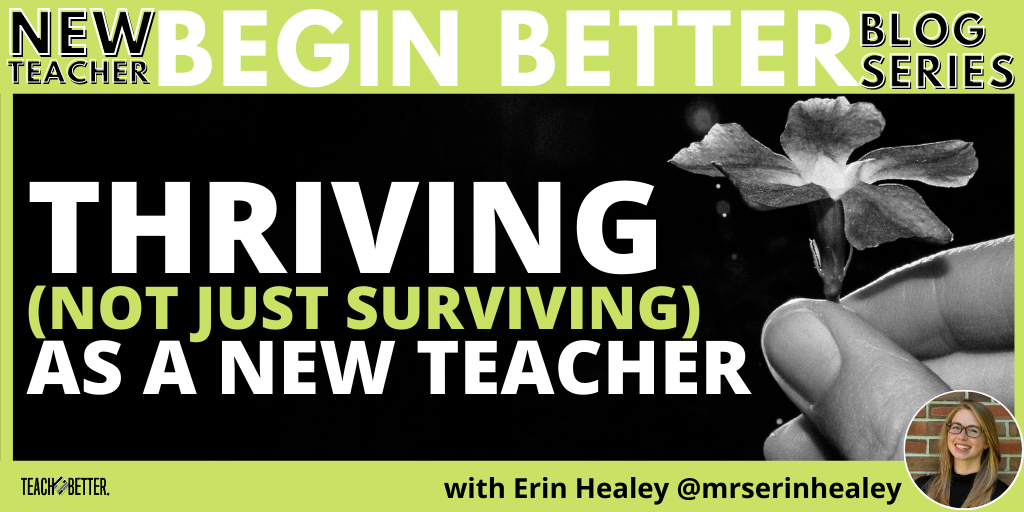TL;DR:
- Consider your why to prevent yourself from feeling burned out.
- Pay attention to what gives you joy and be sure to give back to yourself.
- Be proactive with your time by scheduling necessary tasks then looking at what you want to do. Be sure to also consider your long-term goals.
- The secret to thriving as a new teacher is being an authentic advocate for yourself.
Welcome back to our ‘Begin Better’ series for new teachers! Last time, I shared some ideas to continue to build foundational skills and keep your practice current with a myriad of professional development resources. Today, I want to talk about how you can manage your time in a way that works for you, on a personal and professional level.
But first, I want to make one thing very clear: There is no such thing as a ‘work-life balance’ in teaching.
Or, let’s be honest, in any career, and especially not in a pandemic! The term ‘balance’ implies an equal expenditure of your time between your job and your personal life.
Not only is that impossible in our educational profession, where our work continues long after our contractual hours are complete, but it is especially a struggle for beginning teachers who are still finding their footing in a new classroom, with new content and new students.
Ask any veteran teacher in your building, and they will look back on their first year almost like a rite of passage—a huge challenge, marked by personal, financial, and professional hardships, that fully enveloped them ‘in the trenches’. For any first-year teachers in this pandemic school year, you are probably feeling this more than any other cohort of teachers! However, it doesn’t have to be this way as a first-year teacher. You might not achieve balance, but you can find equitable ways to manage your time that will help you thrive as a new teacher.
You need to be honest with yourself. And when you discover hard truths, work to be the change that you need. Ask for help from the awesome community you’ve built around you from our third blog in this series! Click To TweetSurviving to Thriving: Work Towards Your ‘Why’
I know I asked you to identify your ‘why’ in this series before, but it bears repeating! What is your central purpose and mission? Why did you become a teacher? It is likely that your focus may have shifted as you have experienced a few more months in the classroom. Or, your ‘why’ has gotten pushed to the side as you navigate the ever-changing demands of hybrid, virtual, and in-person learning.
You spent years acquiring degrees, knowledge, and experience to be here, in this classroom, with these students. If you weren’t passionate about it, you wouldn’t be here. This is not an attempt to push toxic positivity on you, it is just the truth! Teachers don’t get into this profession for the paycheck. They tirelessly work with the next generation because they care. Because of this, working towards your ‘why’ should give you energy. And it is that energy that I want to focus on here.
This could look like increasing your one-on-one conversations with students, or finding new and diverse texts for your read-aloud. Or, you could be utilizing technology in a new way that lets your students see their learning in action beyond the four walls of your classroom. Identifying these areas of passion for you will not only help you see purpose in your career, but will also make you a much stronger teacher!
There are many aspects of this profession that might cause you to burn out of energy and prevent you from feeling like you are thriving. Finding opportunities to intentionally work towards your ‘why’ will fuel you through those moments of stress or weakness, and support you in feeling more fulfilled at the end of the day.
Surviving to Thriving: Pay Attention to What Gives You Joy
I had a conversation with my sister about this recently. She is a data analyst for the state government. I asked her what she does on a daily basis that feels good to her body and spirit. She candidly responded that she doesn’t slow down long enough to figure that out! This is such a common occurrence with teachers, and especially with newer educators. When we constantly give ourselves to others, when do we give back to ourselves?
Finding moments to pause and listen to your body and your heart are absolutely critical. Maybe this looks like a slow Sunday morning, or a reflective Friday night. Find a moment by yourself to think about the actions you take, the food you consume, the conversations that you have, and the media that you engage with, that bring you joy.
Make a list! This may look like a long run, or a glass of water before your morning coffee, or a phone call to your mom, or meditation. It may even contain some school-related activities, like the feeling you get after coaching a long but productive soccer practice, or when your student actors finally land that tricky choreography.
We cannot only do these things that bring us joy, but we do need to find a place for them in our lives.
Rushing through our days, constantly reacting to all the little fires that keep popping up, leaves us feeling empty and unfulfilled. Placing intention on small acts that do bring you joy and creating a routine around those actions will help you feel like you are thriving rather than just surviving.
I hope you do not see a challenge in this! I don’t want you to add things to your list, since a teacher’s time is a precious commodity. Rather, I want you to think of ways you could change habits you already have, or find more purpose in those actions.
For example, I have a daily morning coffee routine that I have recently altered, to start my day with more intention and joy. Rather than veer from my morning commute to stop at the local Dunkin’, I replaced that time by brewing my own freshly ground beans in my moka pot and DIY-ing a latte. The time it takes to hit the button on my bean grinder and let the espresso percolate is equivalent to the time I normally waited at the drive-in for my coffee. (Yes, I timed it, because I am not willing to wake up earlier than I need to in the mornings!) I can pack my lunch and papers for the day while making my kitchen smell like a cafe, which makes my mornings much more enjoyable and intentional.
Surviving to Thriving: Proactively Schedule Your Time
Whether you are using a paper planner, Google calendar, or the Reminders app on your phone (or all of the above), make sure that you are actively planning your days in advance. You need to have a realistic understanding of what you can accomplish in a day, and the only way to do so is to adhere to a schedule. This might seem very ‘Type-A’, but I promise, it keeps you from feeling overwhelmed. And it also allows you to build in time for those joy-creating opportunities and intentional tasks.
One thing that is incredibly draining for new teachers is the feeling of never ‘being ready’. It is understandable, since you are working in a fast-paced and high-stakes environment, but it is something you can manage proactively.
Start on Saturday morning and look at the week ahead of you. What do you need to do? Most likely, create five days worth of lesson plans, grade last week’s essays, prepare for the 504 meeting on Wednesday, submit your evaluation data, pick up your niece’s birthday present, and at some point make a meal for yourself. You also should identify which of these tasks fulfills your ‘why’ to ensure you are building on your passions on a daily basis.
Schedule your necessary tasks first.
And make sure you are planning your week in a way that allows you to accomplish the task a full 24-hours before it needs to be done. By giving yourself the grace of some wiggle room and flexibility, you are already more prepared than you would be if you spent every night planning tomorrow’s lesson. It also gives you time to go back and reflect or revise your work, making sure you are the most prepared you could possibly be.
This might be tricky, but try to plan to do as much school-work as possible at school. The line between ‘work’ and ‘life’ has become so blurred with the pandemic that you are more likely to feel productive if you are doing your job outside of your home. Take full advantage of your prep block, or mentally extend your workday to last an hour after the final bell. Being able to leave your work at work is a privilege that teachers did not have in 2020, and need to take advantage of it in the future.
Then, look at what you want to do.
Want to fit in two long runs, or a coffee date, or see a movie with a friend? Schedule those in advance. They bring you joy, and are going to be more important in the long run than whatever random situation pops up last minute during the week. Putting yourself first on your calendar will also ensure that you actually do the things that bring you joy, and make you feel like you are thriving.
Finally, consider your long-term goals.
We wrote them down in the second post of this blog series! Schedule some time in your week, if possible, to chip away at some of those checkpoints on your journey. This could be a shorter extended goal, like mapping out the unit for next quarter, or a larger goal, like applying for a graduate program next year. Slow and steady progress is less overwhelming than continuously pushing off your goals, because you’re too overwhelmed by reactive circumstances arising every day.
If you schedule your week on a Saturday, that gives you all of Sunday to be more intentional in your prep for the week. You only need to target the tasks you wrote down, which will allow you to accomplish them quicker and sincerely enjoy the feeling of ‘being ready’ for the week. Try not to fill in the blank spaces you will see in this schedule. You still may need some flexible time to quickly douse any fires that do pop up during the week. But with a more forward-thinking approach, they will seem like less of an overwhelming issue and won’t interfere with your necessary weekly tasks.
You could also spend time on your weekend looking back at your schedule from the last week, and relish all the work that you were able to accomplish because you were proactive and focused! That absolutely sounds like thriving to me!
[scroll down to keep reading]
The Secret to Thriving as a New Teacher
So how can we take these ideas and truly thrive as a new teacher? The first and hardest step is also the most critical. It is the one thing that combines all of these ideas and does require the most work for you. But when embodied in your daily life, it is the secret that will set you up for success in every way.
Surviving to Thriving: You need to be an authentic advocate for yourself.
No one else is going to do it for you. Only you can look into the mirror and ask yourself if you are fulfilling your purpose with intention. Only you know if the actions you are taking are fueling your energy, or if you are constantly running on empty. And only you can create a life that you enjoy.
You need to be honest with yourself. And when you discover hard truths, work to be the change that you need. Ask for help from the awesome community you’ve built around you from our third blog in this series! Proactively build happiness and fulfillment into your daily life, and create habits that continue that joy and intention.
I know it seems easier said than done. But I hope this blog gives you some actionable steps to start thriving, instead of just surviving, as a new teacher! I can’t wait to hear about your journey!
About Erin Healey
Erin is an English teacher at Chariho High School, in Rhode Island. She is the founder of the Young Educators Society of Rhode Island (@yesriorg), a Highlander Institute Fuse Fellow, current Master’s student studying Education Technology at the University of Connecticut, and can always be found drinking coffee (preferably a PSL)!



